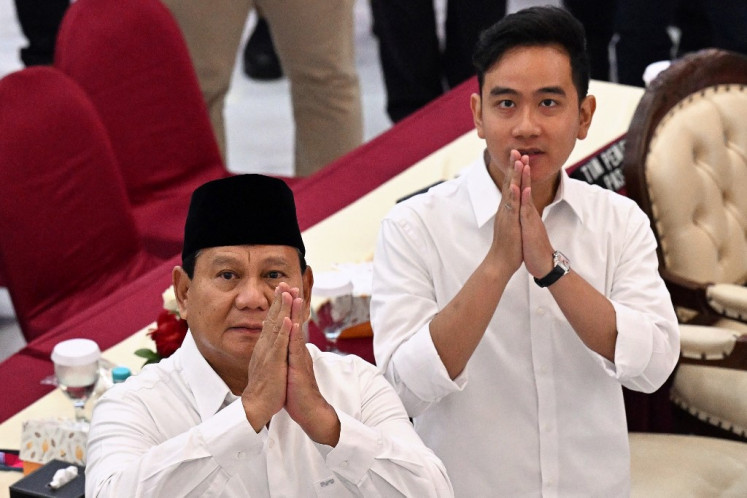‘Rambo City’ yearning for peace
Peaceful prayers: Muslims pray at Sunehri Mosque in Peshawar
Change Size

P
span class="inline inline-center">Peaceful prayers: Muslims pray at Sunehri Mosque in Peshawar. Mosques in the city have become targets for terrorist acts by the Pakistani Taliban, which holds a very strict and conservative view of Islamic teachings.
Peshawar, the capital of Khyber Pakhtunkhwa province in Pakistan, is mostly known for its cameo in Sylvester Stallone’s blockbuster Rambo III.
In Sylvester Stallone’s action blockbuster Rambo III, the omnipotent hero visits the city of Peshawar as he seeks to gather support for his one-man blitzkrieg in Afghanistan to save his old friend.
Today, the Rambo-themed warring atmosphere can still be felt in Peshawar, which is located near the Afghanistan-Pakistan border. Over the past decade, the city has seen dozens of bomb blasts, with Taliban terrorists killing civilians by detonating remote-controlled explosives in public places, from markets to mosques.
It is common here to see businesses such as drugstores and textile shops and government institutions like hospitals and schools guarded by security officers with sub-machine guns or shotguns slung around their shoulders.
Meanwhile, people coming in and out of the city must pass military check posts guarded by fully geared soldiers, each equipped with body armor and an AK-47 assault rifle.
Peshawar stands as the center of a showdown between the Pakistani military and Tehrik-i-Taliban terrorist group — not to be confused with the Afghan Taliban as they have a completely different mission and set of objectives.
The city witnessed the Pakistani Taliban’s most gruesome terrorist act in December 2014 when they opened fire in the Army Public School in Peshawar, mercilessly murdering 141 people, most of whom were schoolchildren, with some as young as 8 years old.
Locals said that various terror acts engulfing Peshawar have mostly been committed as vengeance against the Pakistan Armed Forces, which regularly conducts military operations in terrorist-laden tribal areas concentrated in Pakistan’s northwest.
“You kill our family and children; we kill yours,” a citizen of Peshawar said, summarizing the Pakistani Taliban’s principles.

Peshawar, a city of 2 million populace, is inhabited mostly by the Pashtun people, the biggest ethnic group in Afghanistan but only the second-largest ethnicity group in Pakistan, who command 15 percent of its population. They reside mostly in the nation’s western areas near its border with Afghanistan.
In Peshawar, the official Pakistani language of Urdu can rarely be heard on the streets, markets and restaurants. Some Pakistani Pashtun can barely speak Urdu at all, as in daily life they converse using Pashto, which is the official language of Afghanistan (the Afghan and Pakistani Pashtun people, however, speak in a slightly different accent).
Nevertheless, the image of Peshawar as an unsafe city overwhelmed by bloody terrorist attacks was a stark contrast with the warm hospitality of the true Pashtun people.
For example, my three-day stay in Peshawar ended with me having spent barely any money at all. The Peshawar citizens would always refuse my money for food or shelter because, according to their Pashtun customs, it is considered obligatory to take care of all their guests’ needs and treat them with highest degree of respect.
“Honestly, we take it as an insult if you give us money,” quipped Zohaib Nawaz, a Pakistani of Pashtun heritage who currently studies in Islamabad, the nation’s capital.
Some Pashtun people can even go as far as to sacrifice their own lives to ensure the safety of their guests. That philosophy is portrayed in the Hollywood movie Lone Survivor played by Mark Wahlberg, which tells the true story of a wounded American soldier who survived the Afghan Taliban’s deadly pursuit thanks to protection provided by Pashtun villagers.
Nevertheless, the local Pashtun people of Peshawar claim the city has seen some improvements in security, noting that there have not been any significant bombings over the past two years.
The citizens also lamented how terrorist acts in Peshawar have always been associated with Islam, as they argued that Muslims like themselves have also suffered immensely from the bloodshed.
“As far as I know, very few victims of the terrorist acts here were Christian or Hindu; most were Muslim,” said Wajid Azam, a native of Peshawar. “Tell me, will the real Muslims really want to kill their own brothers and sisters?”
— Photos by JP/Putera Satria Sambijantoro









